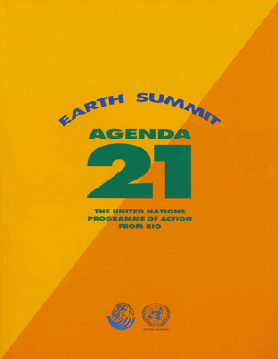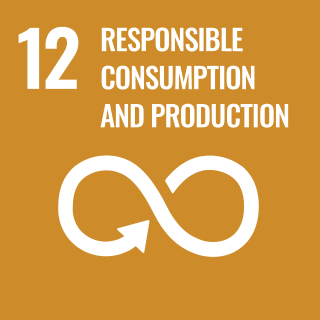Related Research Articles

The economy of Grenada is largely tourism-based, small, and open economy. Over the past two decades, the main thrust of Grenada's economy has shifted from agriculture to services, with tourism serving as the leading foreign currency earning sector. The country's principal export crops are the spices nutmeg and mace. Other crops for export include cocoa, citrus fruits, bananas, cloves, and cinnamon. Manufacturing industries in Grenada operate mostly on a small scale, including production of beverages and other foodstuffs, textiles, and the assembly of electronic components for export.
Sustainable development is an approach to growth and human development that aims to meet the needs of the present without compromising the ability of future generations to meet their own needs. The aim is to have a society where living conditions and resources meet human needs without undermining planetary integrity. Sustainable development aims to balance the needs of the economy, environment, and social well-being. The Brundtland Report in 1987 helped to make the concept of sustainable development better known.

Tourism is travel for pleasure, and the commercial activity of providing and supporting such travel. UN Tourism defines tourism more generally, in terms which go "beyond the common perception of tourism as being limited to holiday activity only", as people "travelling to and staying in places outside their usual environment for not more than one consecutive year for leisure and not less than 24 hours, business and other purposes". Tourism can be domestic or international, and international tourism has both incoming and outgoing implications on a country's balance of payments.

The United Nations Economic and Social Council (ECOSOC) is one of the six principal organs of the United Nations, responsible for coordinating the economic and social fields of the organization, specifically in regards to the fifteen specialized agencies, the eight functional commissions, and the five regional commissions under its jurisdiction.

The United Nations Environment Programme (UNEP) is responsible for coordinating responses to environmental issues within the United Nations system. It was established by Maurice Strong, its first director, after the United Nations Conference on the Human Environment in Stockholm in June 1972. Its mandate is to provide leadership, deliver science and develop solutions on a wide range of issues, including climate change, the management of marine and terrestrial ecosystems, and green economic development. The organization also develops international environmental agreements; publishes and promotes environmental science and helps national governments achieve environmental targets.

Agenda 21 is a non-binding action plan of the United Nations with regard to sustainable development. It is a product of the Earth Summit held in Rio de Janeiro, Brazil, in 1992. It is an action agenda for the UN, other multilateral organizations, and individual governments around the world that can be executed at local, national, and global levels. One major objective of the Agenda 21 initiative is that every local government should draw its own local Agenda 21. Its aim initially was to achieve global sustainable development by 2000, with the "21" in Agenda 21 referring to the original target of the 21st century.

World Toilet Day (WTD) is an official United Nations international observance day on 19 November to inspire action to tackle the global sanitation crisis. Worldwide, 4.2 billion people live without "safely managed sanitation" and around 673 million people practice open defecation. Sustainable Development Goal 6 aims to "Ensure availability and sustainable management of water and sanitation for all". In particular, target 6.2 is to "End open defecation and provide access to sanitation and hygiene". When the Sustainable Development Goals Report 2020 was published, United Nations Secretary-General António Guterres said, "Today, Sustainable Development Goal 6 is badly off track" and it "is hindering progress on the 2030 Agenda, the realization of human rights and the achievement of peace and security around the world".

Since 1980, the United Nations World Tourism Organization has celebrated World Tourism Day as international observances on September 27. This date was chosen as on that day in 1970, the Statutes of the UNWTO were adopted. The adoption of these Statutes is considered a milestone in global tourism. The purpose of this day is to raise awareness on the role of tourism within the international community and to demonstrate how it affects social, cultural, political and economic values worldwide.

The G20 or Group of 20 is an intergovernmental forum comprising 19 sovereign countries, the European Union (EU), and the African Union (AU). It works to address major issues related to the global economy, such as international financial stability, climate change mitigation and sustainable development.

Sustainable tourism is a concept that covers the complete tourism experience, including concern for economic, social, and environmental issues as well as attention to improving tourists' experiences and addressing the needs of host communities. Sustainable tourism should embrace concerns for environmental protection, social equity, and the quality of life, cultural diversity, and a dynamic, viable economy delivering jobs and prosperity for all. It has its roots in sustainable development and there can be some confusion as to what "sustainable tourism" means. There is now broad consensus that tourism should be sustainable. In fact, all forms of tourism have the potential to be sustainable if planned, developed and managed properly. Tourist development organizations are promoting sustainable tourism practices in order to mitigate negative effects caused by the growing impact of tourism, for example its environmental impacts.

The World Travel & Tourism Council (WTTC) is a forum for the travel and tourism industry. It is made up of members from the global business community and works with governments to raise awareness about the travel and tourism industry. It is known for being the only forum to represent the private sector in all parts of the industry worldwide. Its activities include research on the economic and social impact of the industry and its organisation of global and regional summits focused on issues and developments relevant to the industry.
The United Nations Sustainable Development Group (UNSDG), previously the United Nations Development Group (UNDG), is a consortium of 36 United Nations funds, programmes, specialized agencies, departments and offices that play a role in development. It was created by the Secretary-General of the United Nations in order to improve the effectiveness of United Nations development activities at the country level.

The Pacific Asia Travel Association (PATA) is a membership association working to promote the responsible development of travel and tourism in the Asia Pacific region.

Tanzania is a country with many tourist attractions. Approximately 38 percent of Tanzania's land area is set aside in protected areas for conservation. There are 17 national parks, 29 game reserves, 40 controlled conservation areas and marine parks. Tanzania is also home to Mount Kilimanjaro, the highest point in Africa.

Amina Jane Mohammed is a British Nigerian diplomat and politician who is serving as the fifth Deputy Secretary-General of the United Nations. Previously, she was Nigerian Minister of Environment from 2015 to 2016 and was a player in the Post-2015 Development Agenda process. She is also Chair of United Nations Sustainable Development Group.

The 2030 Agenda for Sustainable Development, adopted by all United Nations members in 2015, created 17 world Sustainable Development Goals (SDGs). They were created with the aim of "peace and prosperity for people and the planet..." – while tackling climate change and working to preserve oceans and forests. The SDGs highlight the connections between the environmental, social and economic aspects of sustainable development. Sustainability is at the center of the SDGs.

Sustainable Development Goal 12, titled "responsible consumption and production", is one of the 17 Sustainable Development Goals established by the United Nations in 2015. The official wording of SDG 12 is "Ensure sustainable consumption and production patterns". SDG 12 is meant to ensure good use of resources, improve energy efficiency and sustainable infrastructure, provide access to basic services, create green and decent jobs, and ensure a better quality of life for all. SDG 12 has 11 targets to be achieved by at least 2030, and progress towards the targets is measured using 13 indicators.

Sustainable Development Goal 8 is about "decent work and economic growth" and is one of the 17 Sustainable Development Goals which were established by the United Nations General Assembly in 2015. The full title is to "Foster sustained, inclusive and sustainable economic growth, full and productive employment and decent work for all." Progress towards targets will be measured, monitored and evaluated by 17 indicators.

The International Year of Basic Sciences for Sustainable Development was proclaimed by the 76th session of the United Nations General Assembly 2 December 2021 for 2022, stressing that the applications of basic sciences are vital for advances in medicine, industry, agriculture, water resources, energy planning, environment, communications and culture, and that basic sciences rupture technologies respond to the needs of humankind by providing access to information and increasing societal well-being, and promoting peace through improved collaboration toward Sustainable Development Goals (SDGs).
Marine resources are resources that are found in oceans and are useful for humans. The term was popularized through Sustainable Development Goal 14 which is about "Life below water" and is one of the 17 Sustainable Development Goals established by the United Nations in 2015. The official wording of the goal is to "Conserve and sustainably use the oceans, seas and marine resources for sustainable development".
References
- ↑ "United Nations declares 2017 as the International Year of Sustainable Tourism for Development" (Press release). World Tourism Organization. 7 December 2015. Archived from the original on 22 February 2016. Retrieved 1 January 2017.